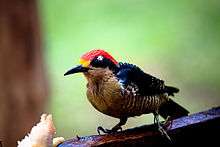Black-cheeked woodpecker
| Black-cheeked woodpecker | |
|---|---|
 | |
| Female in Costa Rica | |
 | |
| Male in Costa Rica | |
| Scientific classification | |
| Kingdom: | Animalia |
| Phylum: | Chordata |
| Class: | Aves |
| Order: | Piciformes |
| Family: | Picidae |
| Genus: | Melanerpes |
| Species: | M. pucherani |
| Binomial name | |
| Melanerpes pucherani (Malherbe, 1849) | |
The black-cheeked woodpecker (Melanerpes pucherani) is a resident breeding bird from southeastern Mexico south to western Ecuador.
This woodpecker occurs in the higher levels of wet forests, semi-open woodland and old second growth. It nests in an unlined hole 6–30 m (20–98 ft) high in a dead tree. The clutch is two to four glossy white eggs, incubated by both sexes.
The binomial commemorates the French zoologist Jacques Pucheran.
The black-cheeked woodpecker feeds on insects, but will take substantial quantities of fruit and nectar.
This common and conspicuous species gives a rattling krrrrrl call and both sexes drum on territory.
Description
The adult is 18.5 cm long and weighs 63 g. It has black upperparts with white barring on the back, white spotting on the wings and a white rump. The tail is black with some white barring, and the underparts are pale buff-olive with a red central belly. There is a black patch through the eyes and on the cheeks, a yellow forehead, and a red nape. The crown is red in the male and black in the female. Young birds are duller, have less white above and less red on the belly.
References
- ↑ BirdLife International (2012). "Melanerpes pucherani". IUCN Red List of Threatened Species. Version 2013.2. International Union for Conservation of Nature. Retrieved 26 November 2013.
- Stiles and Skutch, A guide to the birds of Costa Rica ISBN 0-8014-9600-4

